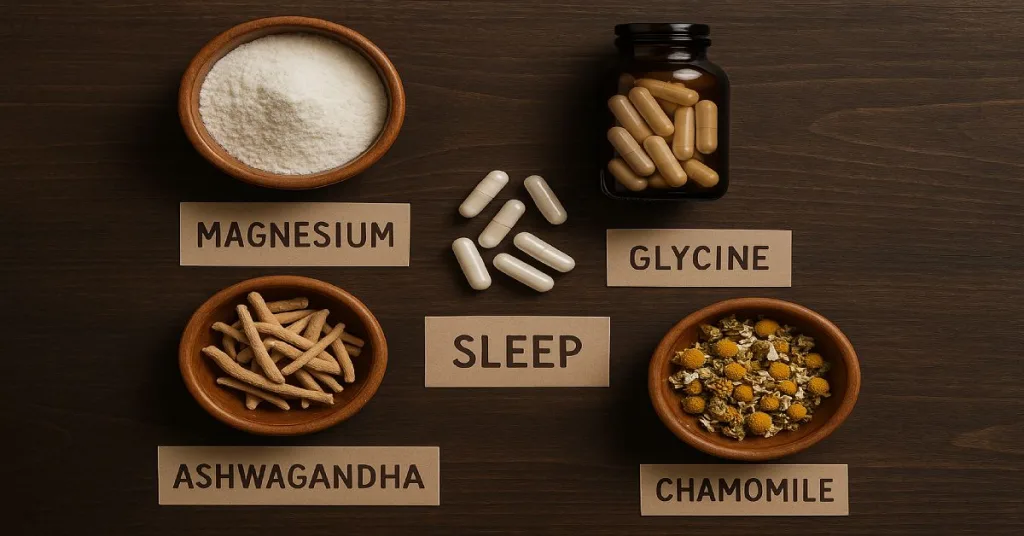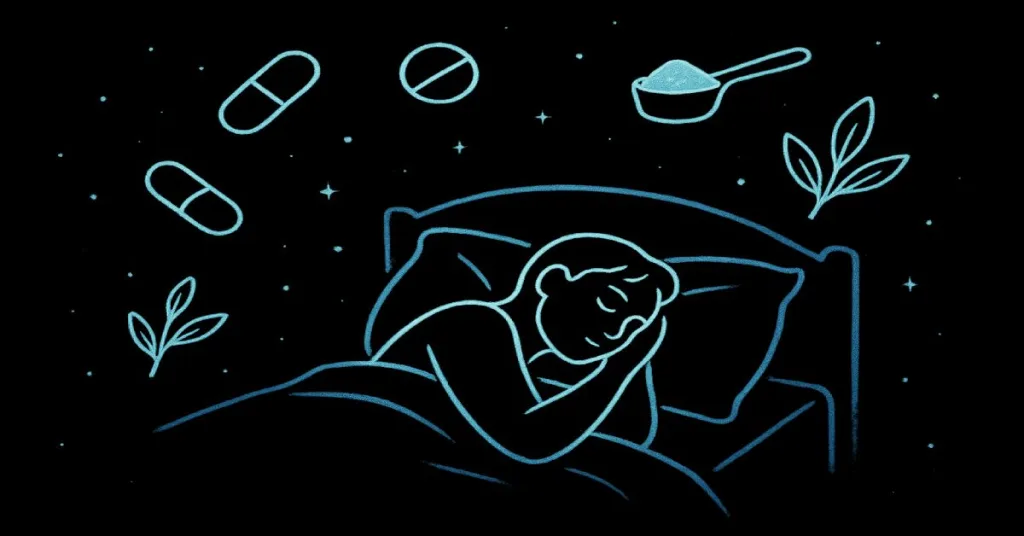Why Sleep Is Harder Than Ever
If you’ve been tossing and turning at night, you’re not alone. Nearly one in three adults struggle with insomnia at some point, and the modern mix of late-night screens, stress, and caffeine overload isn’t helping.
The knee-jerk solution is often prescription sleeping pills. But while they can knock you out, many come with a heavy downside: dependency, grogginess, and long-term health risks.
The good news? There are science-backed natural sleep supplements and hacks that can actually improve sleep quality without the baggage of addictive drugs.
This post may contain affiliate links. If you click and purchase, I may earn a small commission at no extra cost to you. I only recommend products I personally use or have thoroughly researched.

The Problem With Typical Sleep Aids
Over-the-counter sleep medications and prescription sedatives usually work by forcing sedation — not by fixing the root causes of poor sleep. That’s why:
- They can cause dependency with long-term use.
- They may disrupt normal sleep architecture (less REM and deep sleep).
- Side effects include grogginess, brain fog, and even rebound insomnia.
That’s why non-addictive alternatives are so appealing. They support your body’s natural circadian rhythm rather than override it.
Sleep Hacks Before Supplements
Before you even reach for a capsule or powder, fix your sleep environment and habits. The most effective supplements work best when paired with these hacks:
- Set a bedtime routine: Go to bed and wake up at the same time daily.
- Block blue light: Turn off screens or use blue-light filters 1–2 hours before bed.
- Cool the room: Ideal sleep temperature is around 65°F (18°C).
- Limit caffeine: Avoid coffee, energy drinks, and pre-workouts after noon.
- Wind down: Try reading, stretching, or meditation instead of scrolling TikTok.
If you’re doing all this and still staring at the ceiling, supplements can be the missing piece.
The Best Non-Addictive Sleep Supplements
Here are the natural sleep aids with the strongest evidence behind them.
Magnesium
One of the most effective and safe sleep minerals. Magnesium helps relax muscles and regulates neurotransmitters that control sleep.
- Best forms: magnesium glycinate or magnesium threonate (not oxide).
- Dose: 200–400 mg about an hour before bed.
Glycine
An amino acid that improves sleep quality and helps the body cool down at night.
- Dose: 2–5 g before bedtime.
- Bonus: also supports muscle recovery.
L-Theanine
The calming amino acid in tea. It promotes relaxation without drowsiness and pairs well with magnesium or low-dose caffeine in the daytime.
- Dose: 100–200 mg before bed.
Ashwagandha
An adaptogenic herb that reduces stress and lowers cortisol — key for falling asleep more easily.
- Dose: 300–600 mg standardized extract.
Chamomile & Apigenin
Chamomile tea has been a bedtime staple for centuries, but its calming effect isn’t just folklore. Researchers have traced much of its sleep-promoting power to a flavonoid called apigenin.
Apigenin is one of chamomile’s key bioactive compounds. It binds to GABA receptors in the brain — the same calming pathway used by prescription sleep medications — but in a gentler, natural way. This interaction helps reduce anxiety and promotes relaxation, making it easier to drift off.
You can get apigenin naturally by drinking chamomile tea, or in a more concentrated form through isolated apigenin supplements. Tea provides a soothing ritual plus the compound, while capsules give a more consistent dose.
Best for: People who want a gentle, non-addictive way to wind down before bed.
Tart Cherry (Melatonin Alternative)
Tart cherries, especially the Montmorency variety, are one of the few foods that naturally contain melatonin — the hormone your body produces to regulate sleep-wake cycles. Unlike melatonin supplements (which often come in 3–10 mg doses that can overwhelm your system), tart cherry provides a much smaller, more natural amount that works with your circadian rhythm instead of against it.
What the research says:
- A 2018 randomized controlled trial found that tart cherry juice increased sleep time by about 85 minutes per night in adults with insomnia.
- Other studies show improvements in sleep efficiency and duration, likely due to its melatonin plus anti-inflammatory compounds.
How to use it:
- Drink 8 oz of tart cherry juice about 1–2 hours before bed.
- Alternatively, use tart cherry extract capsules (typically 1,000 mg) if you don’t want the sugar from juice.
Best for: People who want a gentler alternative to melatonin supplements, or those who prefer food-based solutions.

What About Melatonin?
Melatonin is popular, but it’s often misused. Small doses (0.5–1 mg) may help with jet lag or occasional insomnia. But blasting your brain with 5–10 mg nightly can actually disrupt your natural circadian rhythm.
That’s why it’s better to focus on supplements that support your body’s own sleep processes rather than override them.
Safe Combinations (Without Addiction Risk)
Stacking a few supplements can work better than one alone:
- Magnesium + Glycine → Deep relaxation and body cooling.
- L-Theanine + Chamomile → Mental calmness and reduced anxiety.
- Ashwagandha + Magnesium → Stress relief plus physical relaxation.
Always start with one, then experiment with combinations.
What to Avoid
- Proprietary “night blends” that underdose key ingredients.
- Overreliance on melatonin.
- Mixing alcohol with sleep supplements (wrecks sleep quality).
Final Verdict
Good sleep is non-negotiable for health, energy, and longevity. While pills that knock you out might seem tempting, they come with real risks.
Instead, smart sleep supplements like magnesium, glycine, and ashwagandha can support natural, restful sleep — without the risk of dependency. Paired with better habits, they can finally help you wake up rested instead of wrecked.
see also: Best Sleep & Recovery Stack for Athletes and Weekend Warriors